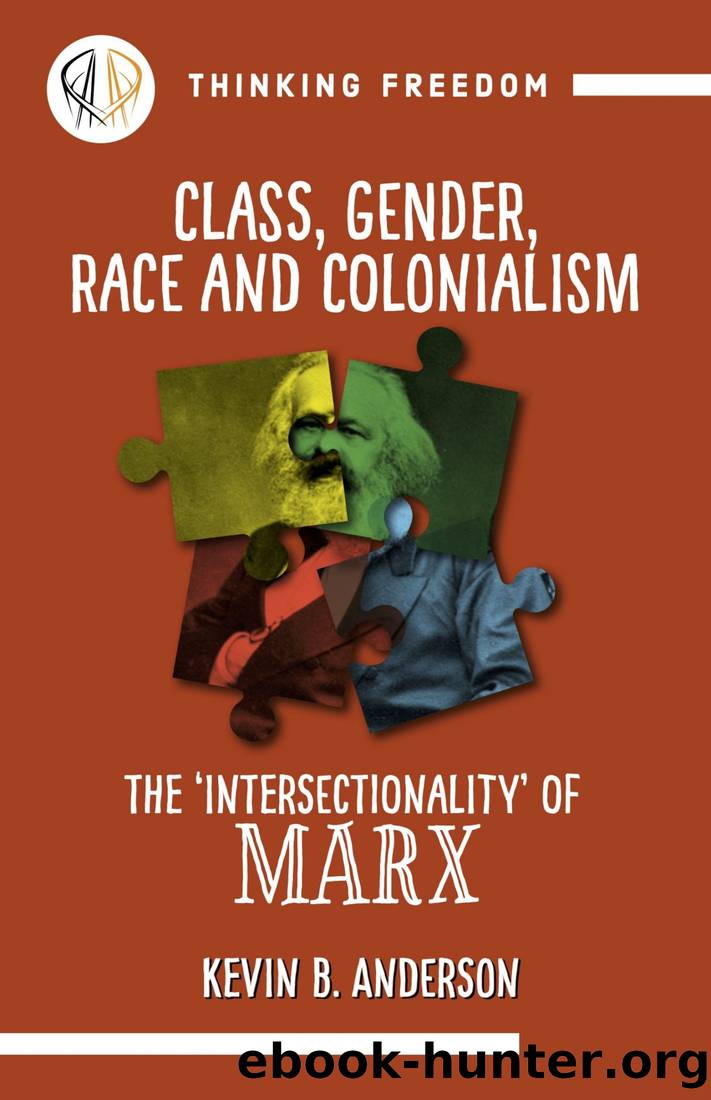Dialectics of Revolution by Kevin B Anderson

Author:Kevin B Anderson [Anderson, Kevin B]
Language: eng
Format: epub
ISBN: 9781988832753
Google: AdcBzgEACAAJ
Goodreads: 57747519
Publisher: Daraja Press
Published: 2020-09-21T00:00:00+00:00
Late Marx: India, Russia, and Beyond
In The German Ideology of 1846, Marx and Engels conceptualised several successive stages of historical development in Eurocentric terms, later called modes of production: (i) clan or tribal, (ii) slave-based ancient GrecoâRoman, (iii) serf-based feudal, (iv) formally free wage-labour-based bourgeois or capitalist, and, it was implied, (v) freely-associated-labour-based socialist. A decade later, in the Grundrisse of 1857â58, Marx discussed modes of production originating in Asia, especially India (the âAsiaticâ mode of production) as a type of pre-capitalist system that did not fall easily under either (ii) or (iii). It represented something qualitatively different, without as much formal slavery, and with communal or collective property and social relations continuing in the villages for a very long time.
For Marx, this constituted a more global and multilinear theory of history, with premodern Asian societies on a somewhat different pathway of development than Western Europe, especially ancient Rome. In Capital, Vol I, he referred to âthe ancient Asiatic, Classical-antique, and other such modes of production,â where commodity production âplays a subordinate roleâ as compared to the modern capitalist mode of production.[35] Marxâs distinction between Asian and European pre-capitalist societies was banned in Stalinist ideology, which clung to the slaveryâfeudalâbourgeois model of successive modes of production, something that required mental gymnastics to fit societies like Mughal India or Confucian China into the âfeudalâ or âslaveâ modes of production. Even as late as the 1970s, the noted anthropologist and Marx scholar Norair Ter-Akopian was dismissed from the MarxâEngelsâLenin Institute in Moscow for having published a book on the Asiatic mode of production.
In notes from his last years not published until after Stalinâs death, Marx summarised and commented upon his young anthropologist friend Maxim Kovalevskyâs Communal Property (1879), especially its treatment of precolonial India. Although appreciative of much of Kovalevskyâs analysis, Marx inveighed against his attempts to treat Mughal India, with its highly centralised state system, as feudal: âKovalevsky here finds feudalism in the Western European sense. Kovalevsky forgets, among other things, serfdom, which is not in India, and which is an essential moment.â Marx concludes that concerning âfeudalism,â âas little is found in India as in Romeâ.[36] These notes, available in English since 1975, did not find their way into the Collected Works of Marx and Engels. Nor can any of the notes on Kovalevsky or other late texts on India be found in the most recent collection of Marxâs India writings.[37] However, Irfan Habibâs comprehensive introduction to this volume does mention briefly the late Marxâs notebooks on India his âobjection to any designation of the Indian communities as âfeudalâ.â[38]
All this would be only an academic topic had Marx not tied these issues to the contemporary issues of colonialism and world revolution. In the years 1848â53, Marx tended toward an implicit support of colonialism, whether in forcing a traditionalist China into the world market, as quoted above from the Communist Manifesto, or in his 1853 articles on India, which celebrated what he saw as modernising and progressive aspects of British rule.
Download
This site does not store any files on its server. We only index and link to content provided by other sites. Please contact the content providers to delete copyright contents if any and email us, we'll remove relevant links or contents immediately.
The remains of the day by Kazuo Ishiguro(8947)
Tools of Titans by Timothy Ferriss(8346)
Giovanni's Room by James Baldwin(7301)
The Black Swan by Nassim Nicholas Taleb(7086)
Inner Engineering: A Yogi's Guide to Joy by Sadhguru(6776)
The Way of Zen by Alan W. Watts(6575)
Asking the Right Questions: A Guide to Critical Thinking by M. Neil Browne & Stuart M. Keeley(5741)
The Power of Now: A Guide to Spiritual Enlightenment by Eckhart Tolle(5725)
The Six Wives Of Henry VIII (WOMEN IN HISTORY) by Fraser Antonia(5486)
Astrophysics for People in a Hurry by Neil DeGrasse Tyson(5169)
Housekeeping by Marilynne Robinson(4420)
12 Rules for Life by Jordan B. Peterson(4292)
Double Down (Diary of a Wimpy Kid Book 11) by Jeff Kinney(4252)
The Ethical Slut by Janet W. Hardy(4232)
Skin in the Game by Nassim Nicholas Taleb(4223)
Ikigai by Héctor García & Francesc Miralles(4219)
The Art of Happiness by The Dalai Lama(4115)
Skin in the Game: Hidden Asymmetries in Daily Life by Nassim Nicholas Taleb(3973)
Walking by Henry David Thoreau(3939)
